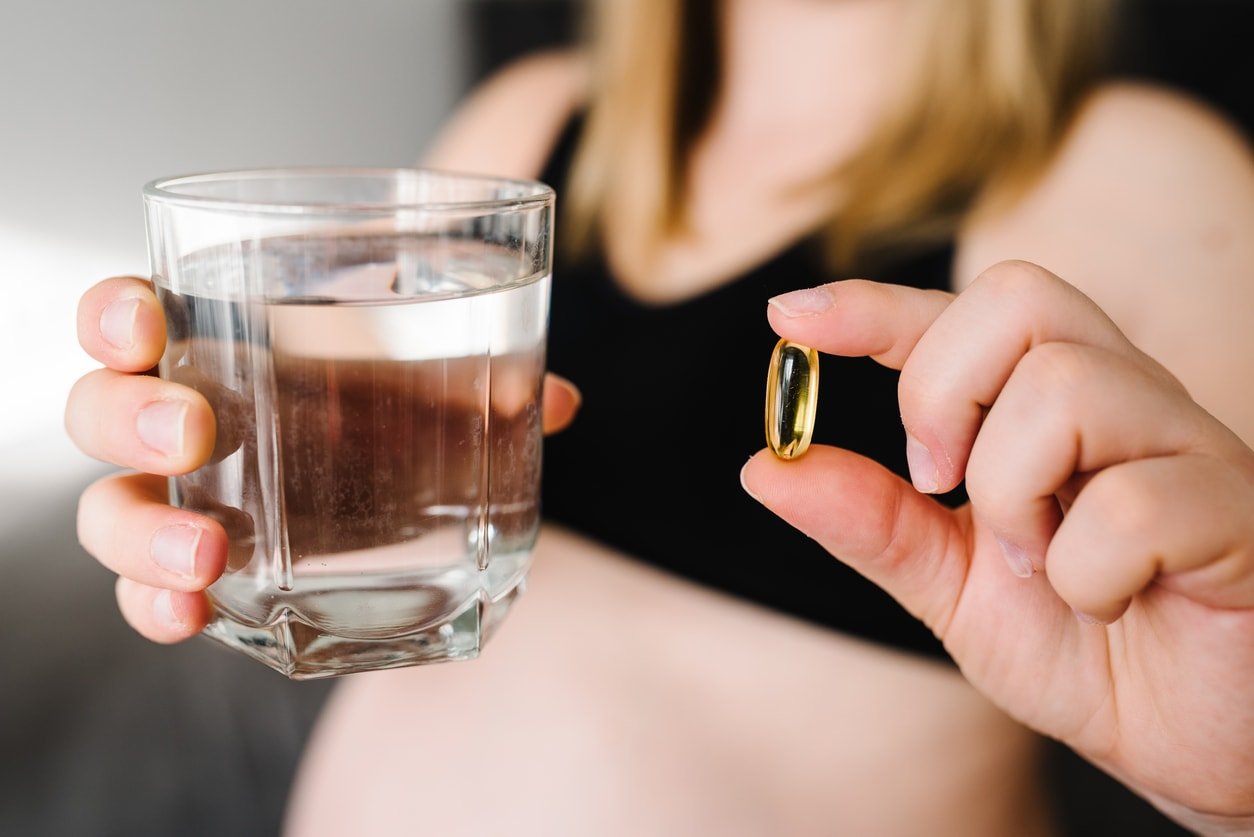
From the moment you discover you’re expecting, the pregnancy advice flows in, wanted or not. While your medical team is the only group with meaningful feedback and advice on your changing body, it’s hard to eliminate all the noise completely, including noise about probiotics and pregnancy.
When you think of bacteria, you probably think of dirt, grime, and illness. But not all bacteria are bad, and that’s where probiotics come in. Probiotics are good bacteria that help keep your body healthy and even fight off harmful bacteria when you have too much of it to balance your microbiome. Microbes in your body are made up of bacteria, fungi, viruses, and protozoa. For a microbe to be considered a probiotic, it must be isolated from a person, survive in your intestine after being eaten, have a proven health benefit, and be safely consumed.1
Unfamiliar with the probiotics scene? Let’s break down the basics of probiotics and pregnancy.
What are Probiotics?
An imbalance in your gut microbiome is believed to contribute to several health problems, such as gastrointestinal issues, immune dysfunction, and infections. Here’s where probiotics shine. In 2001, the World Health Organization and the Food and Agriculture Organization of the United Nations combined efforts to evaluate the safety of probiotics. They redefined probiotics as “Live microorganisms which, when administered in adequate amounts, confer a health benefit on the host.” But you can essentially think of probiotics as good bacteria.2
One reviewed study, published in 2022, showed humans need a variety of gut bacteria that know how to do different things. Like people in a community, everyone has a job to do because not one person can do all of them. The reviewed study showed that a constant observation showed healthy people have higher diversity and variety of bacteria in their guts.8
The Benefits of Taking Probiotics During Pregnancy
Decades of studies on specific probiotic strains have revealed various health benefits, from helping reduce the incidence of antibiotic-associated diarrhea to helping manage digestive discomfort, including irritable bowel syndrome, and decreasing the risk or duration of upper respiratory tract infections like the common cold.3
Plus, as we all know, with pregnancy comes additional hormonal changes. Along with discomfort, bloating, sleeplessness, night sweats, mood swings, and many other super fun side effects, pregnant women are at an increased risk for bacterial vaginosis (BV) because of hormone changes during pregnancy. There is some evidence that when pregnant women eat probiotics or use topical probiotic creams, they can prevent urogenital tract disorders like BV, yeast infections, and UTIs.2,10
Benefits for Babies
Probiotics and pregnancy may lead to benefits for babies, too. Scientific evidence suggests probiotics can help reduce colic symptoms in breastfed babies, reduce symptoms of lactose maldigestion, and even reduce necrotizing enterocolitis in preterm infants.4,11,12
Another common infant issue is eczema, which can be painful for you and your baby. Expecting moms might be surprised by probiotics’ effects on themselves and their baby-to-be before birth. A significant analysis found pregnant women who include probiotics in their diet can prevent this painful allergic skin disease. Pregnant women given probiotics starting at 36 to 38 weeks gestation through the initial 3-6 months of lactation may reduce the risk of eczema in their children.6
These supplements were either single or multiple organisms, given as capsules, powder, or part of a drink or infant formula milk, at a dose of 1 to 10 billion colony-forming units (CFU) per day. And if you want to prevent common allergies in your little one, a probiotic might help you do just that. In a double-blind, randomized, placebo-controlled trial, a probiotic was given to pregnant women four weeks before delivery, then to newborns at high risk of allergy for six months. The result? There was a significant impact on babies’ immune response and reduction in allergic diseases.6
Good Probiotics to Purchase
Probiotics come in various forms, and how you incorporate them into your healthcare routine depends on the issue you’re looking to address and your preference. Probiotics can be ingested as dietary supplements, in foods like yogurt, fermented drinks like kombucha, and tablets, drops, liquids, and oral or vaginal capsules. As mentioned, probiotics are regularly used to treat common ailments like diarrhea, yeast, and bacterial vaginosis.7
A general recommendation is to choose probiotic products containing at least 1 billion colony-forming units containing the genus Lactobacillus, Bifidobacterium, Bacillus, or Saccharomyces boulardii. Before stocking up on probiotic supplements, you should talk to your doctor to ensure you’re purchasing the right one for your health concerns.9
1. Garden of Life
Buy Here
Garden of Life Probiotics Once Daily provides 30 billion CFUs of 14 probiotic strains, including Bifidobacterium lactis, Lactobacillus acidophilus, and Lactobacillus casei. It is non-GMO, gluten-free, dairy-free, soy-free, and has a vegetarian formula. It is also a single, once-a-day pill.
2. Renew Life
Buy Here
Renew Life’s prenatal probiotic is free of gluten, soy, and dairy, and these vegetarian capsules include 10 billion live cultures and one probiotic strain.
3. Culturelle
Buy Here
Culturelle’s digestive daily probiotic supplement is touted for its high-quality, middle-of-the-road price, and third-party testing. One Culturelle Digestive Daily probiotic capsule has 10 billion CFUs of Lactobacillus rhamnosus GG. This probiotic strain may benefit symptoms like diarrhea, gas, and bloating, plus 200 mg of prebiotic inulin, which fuels beneficial gut bacteria.
Whichever ailment you want to cure, your probiotics and pregnancy path will likely look different than the plan that works for your pregnant bestie. Because probiotics are sold as supplements, the U.S. Food and Drug Administration (FDA) does not regulate them. So check with your medical provider first for whichever product or probiotic you choose. If you’re incorporating probiotic foods into your diet, like yogurt, kefir (a yogurt-like beverage), kombucha (fermented black tea), sauerkraut (refrigerated, not shelf-stable), kimchi (made from fermented cabbage) and tempeh and miso (made from fermented soybeans), they can all provide a nourishing environment for healthy bacteria to thrive.
Sources
1. https://my.clevelandclinic.org/14598
2. https://www.fao.org/3/a0512e/a0512e.pdf
3. https://www.aafp.org/aafp/pubs/afp/2008/1101/p1073.pdf
4. https://publications.aap.org/141/1/e20171811/37745/
5. https://isappscience.org/
6. https://journals.plos.org/10.1371/1002507
7. https://www.ncbi.nlm.nih.gov/3056676/
8. https://www.microbiologyresearch.org/jmm/10.1099/jmm.0.001625
9. https://health.clevelandclinic.orcolong/
10. https://www.marchofdimes.org/
11. https://www.ncbi.nlm.nih.gov/5844696/
12. https://pubmed.ncbi.nlm.nih.gov/29425071/
This article contains affiliate links. These opinions are our own. However, if you buy something, we may earn a small commission, which helps us keep our content free to our readers. Check out our Chick Picks Shop to see more of our recommended products. It’s our carefully curated shop of products we love and recommend! ❤️

 PARENTING TIPS
PARENTING TIPS PREGNANCY
PREGNANCY BABY CARE
BABY CARE TODDLERS
TODDLERS TEENS
TEENS HEALTH CARE
HEALTH CARE ACTIVITIES & CRAFTS
ACTIVITIES & CRAFTS


